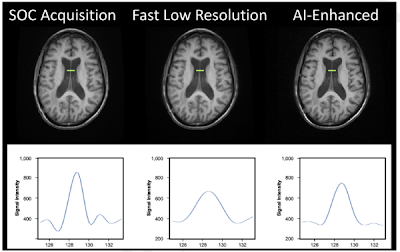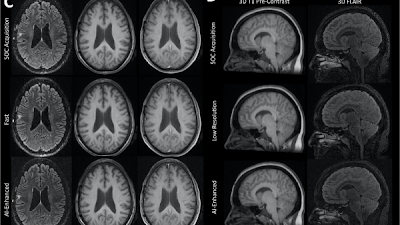Recently, authors from UCSF Radiology and Subtle Medical prospectively evaluated AI-based image enhancement in patients undergoing clinical brain MRI. Their brief was published in Radiology: Artificial Intelligence. Corresponding author on this paper was Javier Villanueva-Meyer, MD, neuroradiologist and UCSF Center for Intelligent Imaging (ci2) member who specializes in brain tumor imaging.

“AI-based image enhancement has the potential to reduce scan times while improving signal to noise ratio (SNR) and maintaining spatial resolution,” say the group of authors which also included Jeffrey Rudie, MD, PhD, former UCSF Radiology clinical instructor, current neuroradiologist at Scripps Health and UCSD Radiology faculty; David Wilson, MD, PhD and Matthew Barkovich, MD, UCSF Radiology faculty; Tyler Gleason, MD, UCSF Radiology neuroradiology clinical fellow; Ajit Shankaranarayanan, Tao Zhang, Long Wang, Enhao Gong, and Greg Zaharchuk from Subtle Medical.
As part of this collaborative work, standard of care 3D T1 precontrast, 3D T2 FLAIR, and 3D T1 postcontrast sequences were acquired along with 45% faster versions of these sequences using half the number of phase encoding steps. From there, images from the faster sequences were processed by an FDA-cleared AI-based image enhancement software for resolution enhancement.

After this, four board-certified neuroradiologists scored the SOC and AI-enhanced image series independently on a five-point Likert scale for image SNR, anatomic conspicuity, overall image quality, imaging artifacts, and diagnostic confidence. They found that while interrater kappa was low to fair, the AI-enhanced scans were noninferior for all metrics. In fact, they actually demonstrated a qualitative SNR improvement. Their quantitative analyses showed that the AI software restored the high spatial resolution of small anatomical structures, such as the septum pellucidum.
“We concluded that AI-based software can achieve noninferior image quality for 3D brain MRI sequences with a 45% scan time reduction, potentially improving the patient experience and scanner efficiency without sacrificing diagnostic quality,” says Dr. Villanueva-Meyer. "The ability to reduce scan time while maintaining diagnostic quality has great implications in the current setting of increased imaging demand amid staffing shortages."



